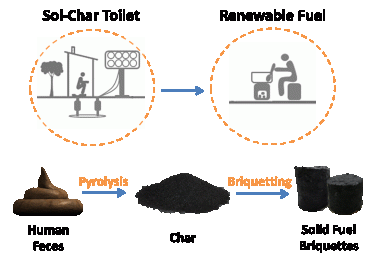Journal Publications

Barbara J. Ward, Tesfayohanes W. Yacob, and Lupita D. Montoya, "Evaluation of Solid Fuel Char Briquettes from Human Waste," Environmental Science and Technology, (2014).
The developing world faces dual crises of escalating energy demand and lack of urban sanitation infrastructure that pose significant burdens on the environment. This article presents results of a study evaluating the feasibility of using human feces-derived char as a solid fuel for heating and cooking and a potential way to address both crises. The study determined the energy content and the elemental composition of chars pyrolyzed at 300, 450, and 750 °C. Fecal chars made at 300 °C were found to be similar in energy content to wood chars and bituminous coal, having a heating value of 25.6 ± 0.08 MJ/kg, while fecal chars made at 750 °C had an energy content of 13.8 ± 0.48 MJ/kg. The higher heating values of the studied chars were evaluated using their elemental composition and a published predictive model; results found good agreement between the measured and predicted values. Fecal chars made at low temperatures were briquetted with molasses/lime and starch binders. Briquettes made with 10% starch had an average impact resistance index of 79 and a higher heating value of 25 MJ/kg. These values are comparable to those of commercial charcoal briquettes, making fecal char briquettes a potential substitute that also contributes to the preservation of the environment.

